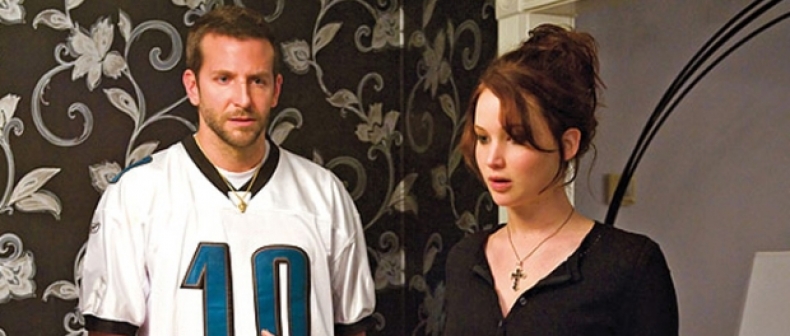
“Silver Linings Playbook”
As someone who still believes in movies as a popular art form (despite the terribleness of most popular movies), the films of David O. Russell hold a special appeal for me. Russell works in an accessible style with big-name stars, but without the usual pandering, and he has his own funny, tough-minded way of seeing things. At bottom, all of his movies (Flirting with Disaster, Three Kings, I Heart Huckabee’s, The Fighter) are about how crazy, hectic, and enraging modern life is and how messed up we all feel, but they’re too generous, too good-humoured to be downers. Russell has some of Jonathan Demme’s affection for ordinary folk — as well as Altman’s feel for milieu and Scorsese’s love of familial squabbling — and he’s able to make light of his characters’ neuroses without downplaying or dishonouring them. His art is the great, consoling art of making psychic turmoil funny.
The subject matter of Russell’s latest, Silver Linings Playbook, couldn’t be more ideal for him. Adapted from a novel by Matthew Quick, it’s about a Philadelphia man named Pat Solitano Jr. (Bradley Cooper) who moves back in with his blue-collar parents (Robert De Niro and Jacki Weaver) after a year in a mental ward. Pat’s got anger issues — he’s been diagnosed as bipolar — but he’s been taking his meds and feels ready to face life again. His immediate goal is to reunite with his estranged wife — a wife he isn’t permitted to see due to a restraining order — and to win her back he embarks on a rigorous self-improvement program: jogging obsessively, reading the classics, apologizing to the people he’s abused.
It’s likely Quick’s novel connected with Russell on a personal level. If you’ve seen the infamous Youtube clip of him flipping out at Lily Tomlin on the set of I Heart Huckabee’s, you know the guy has anger issues of his own, and like Pat, he’s spent “time away” — not in a mental ward, but in Hollywood exile. More than six years passed between I Heart Huckabee’s and The Fighter (another film, Nailed, was begun in the interim but never completed), and there was a general sense that the latter movie represented a mea culpa on his part — an effort to get back into Hollywood’s good graces by showing how professional he could be. (Hollywood rewarded him with Oscar nominations for Best Picture and Best Director.) Also, Russell’s teenage son is bipolar. He appears in Silver Linings, briefly, as a dorky kid trying to interview Pat for a school project on mental illness.
For a good hour or so, the movie is hugely heartening entertainment — funny, humane, uncynical, but without any of the sharp edges smoothed over. Pretty much immediately, Pat stops taking his pills — they make him tired and bloated — and his manic rages return. The outbursts — at his parents, at his psychiatrist’s secretary, at Ernest Hemingway — are entertaining, but they’re always genuinely uncomfortable, too. We laugh while registering the pain underneath. And when Russell flashes back to the incident that got Pat institutionalized — an outburst of violence after finding his wife in the shower with another man — the awfulness of the moment isn’t glossed over. We see Pat grab the shower head and viciously clobber the man with it. The scene isn’t remotely funny, and it helps keep Pat from becoming another too-loveable movie nutter.
Later, Pat attends a dinner party and meets the cranky, clinically depressed Tiffany (Jennifer Lawrence), who’s still grieving the death of her husband. The two compare notes on all the pills they’ve taken, then Tiffany asks Pat to walk her home even though the meal’s only half over. Outside her house, Pat tells Tiffany he doesn’t want to sleep with her because he’s married and wants his wife back, and she tells him she shouldn’t be sleeping with anyone anyway because she uses sex as a coping mechanism. It’s an excellent screwball comedy set-up — reason versus passion — and it holds out the promise of a nicely combustible courtship.
For awhile, we get just that. Some of the film’s best scenes are the early flirty ones in which Pat and Tiffany run into one another while jogging. Tiffany deliberately times her jogs so they coincide with his, and she gets a perverse kick out of surprising him, berating him about something, then running off again. The trouble comes in the film’s second half, when over-determined Hollywood plotting takes hold. Pat and Tiffany make a deal: if she’ll help him get letters to his wife, he’ll be her partner in an upcoming dance competition. Meanwhile, Pat’s bookie dad makes a dumb, potentially ruinous bet that his son can both win the competition and, via good juju, make the Eagles win the playoffs. Almost imperceptibly, the focus shifts from Pat and Tiffany’s mental health to a bunch of mundane, superficially imposed concerns. Instead of the hard-won, day-to-day victories of living with mental illness, we get the easy, meaningless victories of winning contests. It’s a real let-down. And the let-down is compounded when the dance contest fails to deliver even a dumb high like that of the beauty pageant in Little Miss Sunshine. It’s badly staged, and we can’t tell if the clumsiness is intentional or not.
Happily, the performances carry us through. As Pat, Cooper finally breaks free of his preppy-dirtbag persona and becomes an appealing, vulnerable everyman. (His constantly dilated eyes no longer suggest coke-addled confidence, they signal neurotic intensity.) Lawrence, meanwhile, projects a wonderful, endearing combination of aggressiveness and fragility. Her Tiffany is self-assured enough to reach for what she wants, but she’s too proud and stubborn to reach out directly — she has to engineer ways to appear casual. And then there’s the wonderful Australian actress Jacki Weaver (Animal Kingdom) as Pat’s mom. She nails the nervous watchfulness of a woman who’s never been able to stop worrying about her boy. And as Pat’s grumpy-but-loving dad, De Niro is better than he’s been in a long time. For years, he’s just seemed like a cranky actor; here, he reveals a surprising tenderness beneath the crankiness.
Though the movie ultimately goes soft, I can’t begrudge it its likely success. It’s a charming picture that’ll probably mean something to a lot of people. And it comes by its charm honestly for the most part, without strong-arming us. I just hope Russell doesn’t abandon the more hard-won happy endings of his earlier films.
____
Scott MacDonald writes about cinema for Toronto Standard. You can follow him on Twitter at @scottpmac. He just started tweeting, so be gentle with him.
For more, follow us on Twitter @TorontoStandard and subscribe to our newsletter.














